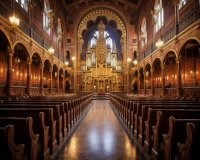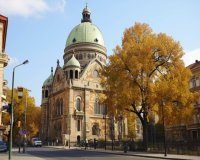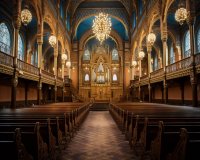A Brief History of Dohány Street Synagogue

A Brief History of Dohány Street Synagogue, Budapest
The Dohány Street Synagogue, also known as the Great Synagogue or Tabakgasse Synagogue, is one of Budapest's most iconic landmarks and a testament to the rich history of the Jewish community in Hungary. This magnificent synagogue has witnessed over a century of triumphs and tribulations, reflecting the resilience and cultural significance of Budapest's Jewish population.
Constructed in the mid-19th century, the Dohány Street Synagogue is an architectural marvel that fuses various styles, predominantly Moorish and Romantic. Designed by the renowned architect Ludwig Förster, the synagogue stands as a testament to the grandeur of religious architecture in Hungary.
Architectural Beauty
The synagogue's façade is a breathtaking sight to behold, with its intricate Moorish arches, ornate decorations, and vibrant color palette. It is an inviting representation of the diverse cultural influences that have shaped Budapest over the centuries.
Stepping inside, visitors are greeted by a grand interior filled with stunning design elements. The central nave is adorned with a magnificent Torah ark, a focal point of religious significance, and the vividly colored stained glass windows add an ethereal quality to the space.
One of the most remarkable features of the Dohány Street Synagogue is its stunning organ, which was added in the 20th century. The organ, with its intricate details and melodious tones, enhances the spiritual experience for congregants and visitors alike.
Surviving Turbulent Times
Throughout its history, the Dohány Street Synagogue has borne witness to turbulent times. During World War II, it served as a refuge for Jews seeking safety from the horrors of the Holocaust. The synagogue's complex includes the Holocaust Memorial, a somber reminder of the lives lost during those dark days.
The synagogue itself suffered significant damage during World War II and was later restored to its former glory. Today, it stands as a symbol of resilience and remembrance, a testament to the strength of the Jewish community in Hungary.
Cultural Hub
Besides its religious significance, the Dohány Street Synagogue has also evolved into a cultural hub. It houses the Jewish Museum, which showcases a vast collection of artifacts and documents related to Jewish history and culture in Hungary. Visitors can explore the rich tapestry of Jewish life, traditions, and contributions to Hungarian society.
Adjacent to the synagogue is the beautiful Raoul Wallenberg Park, named in honor of the Swedish diplomat who saved countless Jewish lives during the Holocaust. The park features a memorial dedicated to Wallenberg and other heroes who risked their lives to protect the persecuted.
Visitor Experience
Today, the Dohány Street Synagogue welcomes visitors from all over the world. Whether you are exploring its stunning architecture, learning about Jewish history, or paying your respects at the Holocaust Memorial, a visit to this historic site is a profound and educational experience.
As you stroll through the synagogue and its surroundings, you'll gain insights into the enduring spirit of the Jewish community in Budapest and their contributions to the city's rich cultural tapestry.
Conclusion
The Dohány Street Synagogue in Budapest is more than just a place of worship; it is a symbol of resilience, remembrance, and cultural heritage. Its captivating architecture, rich history, and commitment to preserving the memory of the Holocaust make it a must-visit destination for anyone exploring Budapest's cultural landscape.
Whether you are drawn to its architectural beauty, its cultural significance, or its role in commemorating the past, the Dohány Street Synagogue stands as a powerful testament to the enduring strength of the human spirit in the face of adversity.
Budapest Private Jewish Walk
During this walk in the 7th District Jewish Quarter of Budapest, you will learn about the rich history and the current situation of the Hungarian Jewish Community. You can also visit the three major synagogues and some of the contemporary scenes.
Highlights
- Visit the Dohany Street Synagogue
- See the Rumbach Street Synagogue
- Enter the Kazinczy Street Synagogue
- Taste traditional Jewish pastry and coffee
- Check out the contemporary scenes in the Jewish Quarter
Full description
To start the tour, meet your private guide at a previously arranged place (your hotel, apartment, or any other spot in the city). Since it's a customized tour, the route may vary according to the meeting point, nevertheless the tour in all cases includes all of the following sights below.
Most of the tour takes place in the 7th District. You will visit several attractions, starting with the Dohány Street Synagogue, the second biggest synagogue in the world. Enter the building and spend about 50 minutes there. Guests receive a guided tour inside, and have the possibility to visit the Jewish Museum that is part of the complex. Leaving the synagogue, you will walk the small and cosy streets of the district, getting an insight into the contemporary, bohemian-artistic nature it has acquired since the 1990's. You will visit the abandoned Rumbach Synagogue, then reach Kazinczy street and visit the beautiful Ortodox Synagogue built in Art Nouveau style.
During the tour you will have a stop in a typical Jewish café where guests are offered a drink, and have the chance to taste the most famous Hungarian Jewish cake (also included in the price). The tour ends at the riverside near the Parliament at the Shoes on the Danube Memorial. You will have a very authentic and detailed picture of the history of the Jewish Community in Hungary from the very beginning to the present, and will also get the chance to discover the hidden secrets apart from the main sights. The duration of the tour is 3-4 hours, but that may also vary according to your request.
Important information
From Friday afternoon until Sunday morning the synagogues are closed. The tour is still bookable, but without entering these attractions.
Shoulders and knees must be covered inside the synagogues.
Accessible for disabled people as well.
The Origins of Dohány Street Synagogue, Budapest
The Dohány Street Synagogue, also known as the Great Synagogue or the Tabakgasse Synagogue, is a remarkable and historic place of worship located in Budapest, Hungary. It is not only a center of religious significance for the Jewish community but also a symbol of architectural and cultural richness.
Construction of the Dohány Street Synagogue began in the mid-19th century, during a time when Hungary was experiencing significant political and social changes. It was designed by the renowned Viennese architect Ludwig Förster and completed in 1859. This synagogue is not only one of the largest in Europe but also a masterpiece of architectural diversity.
The synagogue's architecture is a fascinating blend of different styles, primarily Moorish and Byzantine influences. Its exterior is adorned with Moorish-style decorative elements, including horseshoe arches, vibrant ceramic tiles, and intricate patterns. These design choices were a nod to the exotic and oriental fascination that was prevalent in Europe during the 19th century.
The interior of the Dohány Street Synagogue is equally stunning. Upon entering, visitors are greeted by a grand and spacious prayer hall adorned with breathtaking frescoes and stucco decorations. The Ark, which houses the Torah scrolls, is a centerpiece of the synagogue, and its design is reminiscent of the Ark of the Covenant. The synagogue can accommodate over 3,000 worshippers, a testament to the size and importance of the Jewish community in Budapest during that era.
Beyond its architectural beauty, the Dohány Street Synagogue holds a significant place in history. It served as a sanctuary for Jews during a tumultuous period when anti-Semitic sentiments were on the rise in Europe. The synagogue provided a place of refuge, faith, and community for Hungarian Jews during World War II and the Holocaust.
One of the most poignant features of the Dohány Street Synagogue complex is the Holocaust Memorial, located in its courtyard. This memorial is a powerful reminder of the atrocities committed during the Holocaust, with a weeping willow tree sculpture that commemorates the lives lost. Visitors can also explore the Jewish Museum, which is part of the complex and contains exhibits that detail the history and culture of Hungarian Jews.
The Dohány Street Synagogue stands as a testament to the resilience and strength of the Jewish community in Budapest. It has not only weathered the storms of history but has also become a symbol of unity, remembrance, and cultural heritage.
In recent years, the synagogue has undergone extensive restoration efforts to preserve its architectural beauty and historical significance. Today, it continues to serve as a place of worship, a cultural center, and a popular tourist attraction, welcoming people from all over the world to learn about its rich history and the enduring spirit of the Jewish community in Budapest.
In conclusion, the Dohány Street Synagogue in Budapest is more than just a place of worship; it is a living testament to the history, culture, and resilience of the Jewish community in Hungary. Its architectural splendor, diverse influences, and historical importance make it a must-visit destination for anyone interested in exploring the vibrant tapestry of Budapest's cultural heritage.
Budapest: Explore the Festive & Jewish Quarter at Your Own Pace
Embark on a self-guided walking tour through Budapest's vibrant Jewish quarter, a fusion of festivity and rich history. Your guide? Your smartphone! Powered by REWIND, this 1.5-hour audio-guided experience offers flexibility and autonomy.
Highlights:
- Take a leisurely stroll along Andrassy Avenue, often dubbed the "Champs Élysées" of Budapest.
- Visit Dohány Street Synagogue, the largest synagogue in Europe.
- Explore the iconic ruin bars, including the famous Szimpla Kert.
Tour Itinerary:
Commence your journey on the elegant Andrassy Avenue, a UNESCO World Heritage Site. Delve into Budapest's communist past at the House of Terror and continue along Andrassy, passing landmarks like the City Opera House.
Enter the Jewish quarter, discovering the monumental Dohány Street Synagogue and poignant sites like the Monument of the Righteous. Uncover the district's transformation into a hub of cultural and artistic events, with insights into the history of Budapest's renowned ruin bars.
How It Works:
Start the tour whenever suits you, alone or with companions. The REWIND app, with its clear audio directions, ensures you won't miss a beat. Pause at your leisure, perhaps at a terrace or shop, and resume seamlessly. The integrated geo-localization feature ensures you stay on track.
Conclude your excursion at Szimpla Kert, the city's most famous ruin bar, capping off an immersive and entertaining exploration of Budapest's Castle district.
Meeting Point:
To commence your audio-guided adventure, visit REWIND activation, enter your reservation number and email, and download the REWIND app. Launch the tour at the starting point by clicking 'play.'
Important Information:
- An internet connection is required throughout the tour.
- Experience the tour via the REWIND app on your smartphone.
- For optimal experience, use headphones; otherwise, audio plays from your smartphone's speakers.
- The tour starts only at the designated point.
- Available in English, French, and Hungarian, the tour lasts approximately 90 minutes.
Book Now:
Secure your spot for this captivating self-guided tour for as low as US$ 9.58 per person. Reserve today and pay nothing until your chosen date.
Customer Reviews:
Rated 4.5/5 based on 24 reviews, this tour promises an enriching and enjoyable experience for solo travelers, couples, and groups of friends and families.
The Synagogue as a Budapest Landmark
The city of Budapest, Hungary, is known for its rich history, stunning architecture, and vibrant culture. Among its many landmarks, the Budapest Synagogue stands out as a symbol of both the city's Jewish heritage and its architectural grandeur.
The Budapest Synagogue, also known as the Dohány Street Synagogue, is not only one of the most significant religious buildings in Hungary but also one of the largest synagogues in Europe. Its history is intertwined with the story of the Jewish community in Budapest, making it a must-visit landmark for both locals and tourists.
Historical Significance
Construction of the Budapest Synagogue began in the mid-19th century, during a time when the city's Jewish population was growing rapidly. The synagogue was designed by the renowned Viennese architect Ludwig Förster and was completed in 1859. Its architectural style is a blend of Moorish, Romantic, and Gothic elements, making it a unique and visually captivating structure.
Throughout its history, the synagogue has witnessed significant events, including both periods of prosperity and moments of hardship. During World War II, Hungary was occupied by Nazi Germany, and the synagogue suffered damage. It served as a shelter for many Jews seeking refuge during those dark times.
After the war, the synagogue underwent extensive restoration and became a symbol of resilience for the Jewish community in Budapest. Today, it stands as a testament to the strength and perseverance of the Hungarian Jewish people.
Architectural Marvel
The Budapest Synagogue's architecture is nothing short of breathtaking. Its exterior features intricate ornamentation, including pointed arches, decorative columns, and vibrant ceramic tiles. The synagogue's façade is adorned with intricate patterns and designs that reflect its Moorish and Islamic influences, creating a visually stunning spectacle.
One of the most iconic features of the synagogue is its magnificent dome, which rises high above the cityscape. The interior is equally impressive, with a soaring nave and a stunning ark containing the Torah scrolls. The synagogue can accommodate thousands of worshippers and visitors, making it a hub for cultural and religious events.
Cultural Hub
Today, the Budapest Synagogue serves as more than just a religious institution. It has become a cultural center that promotes Jewish heritage and history. Visitors can explore the Jewish Museum, located within the synagogue complex, which houses a vast collection of artifacts, documents, and artworks that tell the story of the Jewish community in Hungary.
The synagogue's courtyard features the striking Tree of Life Memorial, dedicated to the memory of the Holocaust victims. This moving sculpture, designed by Imre Varga, is a poignant reminder of the atrocities of the past and the resilience of the Jewish people.
Visiting the Budapest Synagogue
If you plan to visit the Budapest Synagogue, keep in mind that it is a place of worship, so it's essential to be respectful of its religious significance. Visitors are encouraged to dress modestly and maintain a respectful demeanor while exploring this magnificent landmark.
Exploring the synagogue and its surroundings is an educational and emotionally moving experience. Whether you are interested in architecture, history, or simply seeking to learn more about the Jewish heritage of Budapest, the Budapest Synagogue is a must-visit destination.
In conclusion, the Budapest Synagogue is not only an architectural marvel but also a symbol of resilience, culture, and history. It stands as a reminder of the rich Jewish heritage in Budapest and the enduring spirit of its community.






